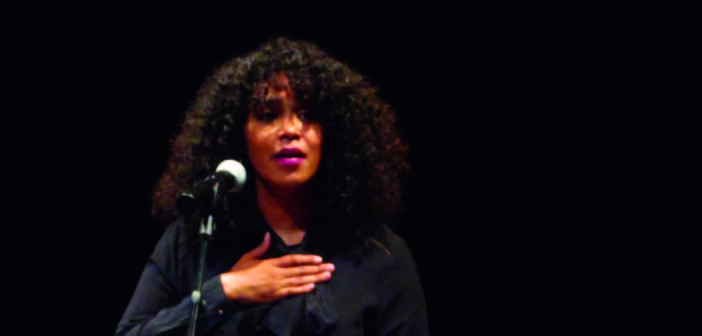An informal “Oh yeah!” was excitingly passed around the room as poet Elizabeth Acevedo performed earlier this month. As part of Hispanic Heritage Month, Dominican slam poet, Acevedo, took the stage at North Central College’s Meiley-Swallow Theater.
For anyone who has ever been to a slam poetry performance, verbal response and audience interaction is not a foreign component. Yet few may recall a time they were encouraged to respond so emotively not only as spectators, but as participants — being equally immersed in the stories that were being told.
“For the next 45 minutes or so, we are going to be in a relationship,” said Acevedo.
It was here that Acevedo opened her performance, calling upon the thematic elements that shaped her youth as a Dominican female growing up in New York City to speak to issues whose relevancy were not lost on those in attendance.
“Artists like Elizabeth address issues that need to be talked about, but do so in a way that is entertaining and engaging for audiences,” CUAB co-president and junior Ashley Clayton said.
The aim of exposing NCC students to this kind of Hispanic Heritage helps grow the knowledge base of North Central students and community members, making for well-rounded individuals.
A mix of Dominican bolero and scholarly terminology, Acevedo’s poetry infused a lifetime of gritty reality faced by a woman of color — and often indistinguishable heritage — and the knowledge she subsequently armed herself with to better acknowledge the complex difficulties that remain a constant fragment of contemporary society.
Between slam poetry pieces and a few instances of rap, Acevedo created an open atmosphere of dialogue with the audience to provide commentary and anecdotal information that inspired the pieces she wrote at varying stages of her life.
Sharing that she was the only person of color in her M.A. creative writing program, Acevedo revealed her affiliation with writing about “the dirty, the real” aspects of life after feeling like her own experiences were not “pretty” enough for traditional poetry.
Perhaps one of the most powerful themes of her performance that night was her belief that all individuals, regardless of their cultural, social or racial background, were worthy of poetry.
Relating experiences that shaped her tumultuous relationship with her identity as an “Afro-Latina” or “Black-Dominican,” Acevedo drove home the idea that her poetry was a mechanism of her own devising in which she was able to reclaim her sense of self, owning the pride she now feels as a member of an indigenous people with a long and checkered history.
Imperialism, prejudice and the sense of a power struggle between races that still permeate the streets of America today were a few of the complexities Acevedo touched upon through a passionate use of course and lyrical language within her poems.
It was the juxtaposition of verses that highlighted the true originality of the poet’s work, proving how influential both her raw, street-lined experiences and her subsequent academic endeavors were in shaping her understanding of a world in which both women and persons of color are not held yet in equal social standing.
Concluding her set with a visceral piece addressing the direction she hopes to one day lead her potential daughter towards, Acevedo addressed the aggressive reality of violence towards women and the frustration she harbors towards the perpetuation of rape culture in the United States.
“I think she touched on a lot of topics that were relevant to women — the poem in regard to sexual violence [was]very moving,” Clayton said.
Truly, Acevedo preceded the poem with a warning that the particular piece was knowingly both uncomfortable for audiences and for her to perform, openly encouraging anyone who felt like they were trigged to tune or step out. The piece, beginning with a torrent of frustrations and anger, ended with a sense of strength and triumph as the poet’s true ferocity as a woman came through.
Far from stuffy, stiff or confining, Acevedo’s performance provided a platform for students and faculty to feel akin to the struggles and triumphs faced by various Hispanic and minority communities, allowing those who felt the weight of her art to take one step closer to bridging the gap between oppressed and non-oppressed people everywhere.

